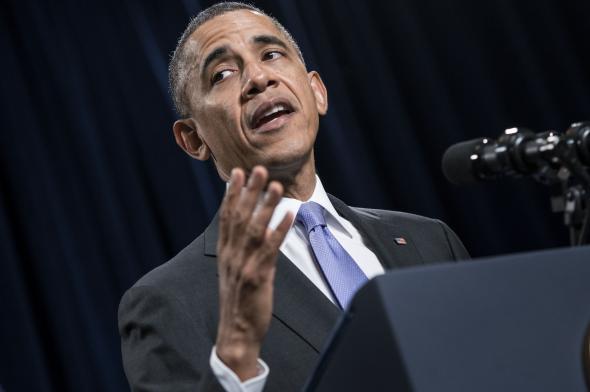On Friday, President Obama visited the House Democratic Caucus Retreat, which was a change from contributing to it. The meeting near the Chesapeake Bay was full of realism about the party’s slim chances to make gains in the 2014 elections. For some, in both the House and Senate, just keeping their jobs is a dicey proposition, which is why in selected races Democrats are distancing themselves from the president’s health care plan. A Democratic super PAC is even running ads praising Democrats for criticizing the White House’s botched rollout of the health exchanges. They get extra points for working to restore coverage to those whom the president had promised would be able to keep their plans and couldn’t.
It’s no surprise that Democrats are on the defensive, but usually when they get together, someone makes the case for why people will like the law as soon as they understand it. A Democratic elected official told me as much this week. But Democrats have been making this case for four years—ever since the law was passed—and it hasn’t moved public opinion much. Based on the president’s remarks to his fellow party members, it appears he isn’t holding out for any miracles.
The president spoke about the upward tick in the enrollment numbers, the number of people who were now on Medicaid, and the fact that there would be fewer uninsured Americans as a result of the law. It followed the familiar pattern from countless other speeches in which he touts whatever the latest good news is for his hard-fought law. But then he did not make the expected pivot of assuring everyone that the more people knew about the Affordable Care Act, the more they would embrace it. Instead, he said: “I just want to say thank you for all of you hanging in there tough on an issue that I think 10 years from now, five years from now, we’re going to look back and say this was a monumental achievement that could not have happened had it not been for this caucus.”
That is cold comfort for a member of Congress. Representatives are up for re-election in nine months; they can’t wait nine years. The repeated recitation of the law’s benefits hasn’t changed the public’s unfavorable views. That will only come over the years—more than a handful of years, the president suggests—if people’s nightmares of higher premiums and losing their doctor don’t come true.
The president has always been wary about the political timeline for the law, though he used to be considerably more bullish. In making his final pitch to Democrats on the eve of their vote, he called out the courage of Reps. John Boccieri and Betsy Markey, who were in tough districts but standing up for the law. The president suggested the praise they were getting portended a possible political upside for the vote. When Ted Deutch won the first congressional election after the health reform law passed, in April 2010, the president had a mini-gloat. “Now look, I mean, let’s not get too excited, it’s a Democratic district. But to listen to the Republicans, they were warning over and over again [the Deutch race] would be a referendum on health care. … Well, maybe it was.” Deutch, who represents the most Democratic-leaning district of the three (by a long shot), is still in office. Boccieri and Markey were defeated in the 2010 elections after the law passed.
Ahead of what appears to be another tough year, Obama wants Democrats to appreciate the moral benefit of their struggle, not just the political one. He is building on the pitch he made four years ago on the eve of the ACA vote, in what is still the most emotional pitch the president has ever made for the legislation. He quoted Lincoln: “I am not bound to win, but I am bound to be true.” Four years later he is promising that they will indeed win. It just may not be in their political lifetime.
